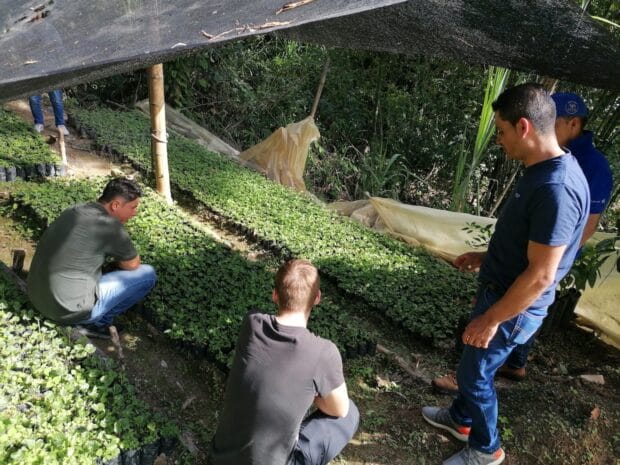Biochar application in Colombia. All images courtesy of Cotierra.
A Swiss-Colombian startup called Cotierra has raised US$1 million in pre-seed funding to expand the development of its biochar solutions while promising to “decarbonize” coffee supply chains.
From its offices in Zurich and Bogotá, the startup company plans to use the cash injection to continue refining its high-efficiency biochar reactor technology while bringing more biochar production to more coffee farms.
Cotierra in Switzerland.
Biochar, a form of charcoal created through specialized burning of biomass such as naturally derived coffee farm waste, has proven effective as a mineral-rich soil amendment for coffee and other agricultural crops. It has shown positive results in stabilizing soil health while also storing carbon for thousands of years.
The material can also increase yields and potentially increase coffee quality, as demonstrated by the pioneering work of former coffee-focused nonprofit Radio Lifeline.
In coffee, biochar been presented by Cotierra and others as a potentially affordable and effective environmental solution that can improve outcomes for farmers while also reducing the need for artificial soil amendments.
Cotierra has been developing and implementing biochar reactor technology, beginning with a trial deployment of a dozen relatively simple kilns, followed by prototypes of a clean-burning mobile reactor.
“Our mobile biochar reactor not only taps into large, decentralized farm networks and abundant on-field residue sources, but also maintains low capital expenditure, allowing for cost-effective, large-scale deployment,” Cotierra Co-Founder and CEO Thomas Käslin recently told DCN.
Participants in the new $1 million funding round include the firms Partners in Clime, Carbon Removal Partners, Carbon Drawdown Initiative and others.
Cotierra’s business model proposes to earn revenue through selling carbon offsets associated with in-house biochar production and farm deployment, as well as through carbon “insetting” solutions for coffee trading and roasting companies.
“Our biochar solution captures and stores carbon in the soil for centuries. We track every step of the process with our third-party certified control system and generate permanent carbon removal credits with significant co-benefits for credit buyers in the voluntary carbon market,” Käslin said. “However, our primary revenue stream is carbon insetting for coffee brands and roasters inside their own coffee value chain to drastically reduce their supply chain emissions. This also includes additional emission reduction generated from biochar application to the soil and the resulting productivity boost.”
A group of women producing coffee in Huila under the cooperative name ASMUER are the first to pilot Cotierra’s decentralized biochar production system.
Cotierra says that farmers using biochar can increase their own profit margins by 30% through improved yields and reduced need for synthetic fertilizers.
The company is currently piloting its biochar-focused projects in Colombia while seeking additional producer and roaster/trader collaborators in order to scale.
Said Käslin, “We believe strengthening farmers in their core business while making them more climate resilient is the most sustainable incentive model for widespread farmer adoption.”
Comments? Questions? News to share? Contact DCN’s editors here.
Howard Bryman Howard Bryman is the associate editor of Daily Coffee News by Roast Magazine. He is based in Portland, Oregon.


